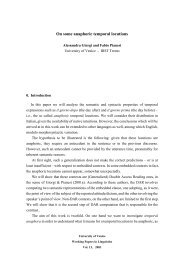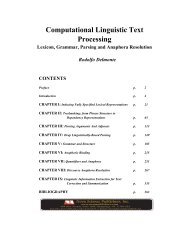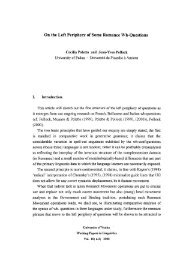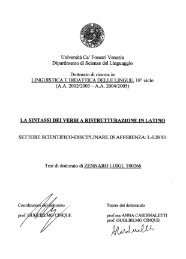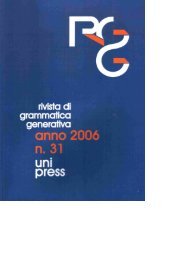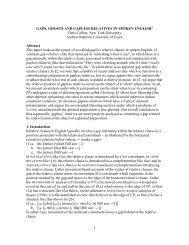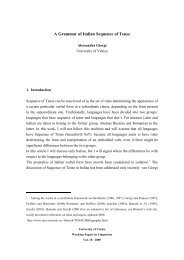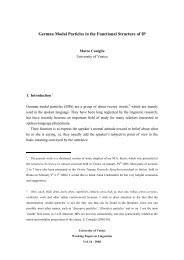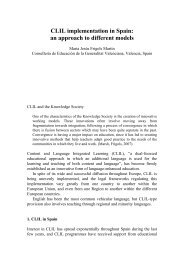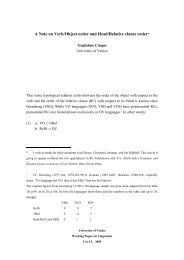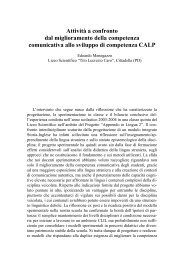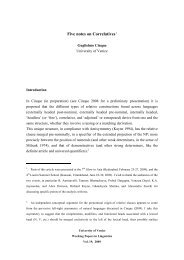Earliness Principle - Lear
Earliness Principle - Lear
Earliness Principle - Lear
Create successful ePaper yourself
Turn your PDF publications into a flip-book with our unique Google optimized e-Paper software.
-36-<br />
(i) a. As for the dictionary, Sue barely relied on it.<br />
b. ?As for the dictionary, Sue relied barely on it.<br />
c. *As for the dictionary, Sue relied on it barely.<br />
d. *Sue’s reliance barely on it surprised us.<br />
(ii)a. John scarcely glanced at the students.<br />
b. ?John glanced scarcely a´t<br />
the students.<br />
c. *John glanced at the students scarcely.<br />
d. *John’s glance scarcely a´t<br />
the students surprised us.<br />
(iii)a. It was easy to get their attention. John simply sho´ted u<br />
to them, and they came.<br />
b. ?It was easy to get their attention. John sho´ted u simply<br />
to them, and they came.<br />
c. It was easy to get their attention. John sho´ted u to them<br />
simply, and they came.<br />
d. *John’s shout simply to them did the job.<br />
(iv)a. Comprendre a` peine l’italien apr`s e cinq ans d’´tude e d´note e<br />
un manque de don pour les langues.<br />
b. Oublier presque son nom c¸a n’arrive pas fr´quemment.<br />
e<br />
(Pollock 1988)<br />
(V. Deprez (personal communication) notes, however, that even in French there are certain<br />
difficulties with examples like (iv)a-b: in certain cases the adverb is actually modifying the direct<br />
object; in others, verb class appears to make a difference (e.g. parler ________________ presque fran c ¸ ais ___<br />
vs.<br />
??rencontrer ____________________<br />
presque Marie).)<br />
21. These occasionally receive one or two question marks in the literature (for example, from<br />
Andrews (1983)), but I have not found any objection to them among informants.<br />
22. This observation puts one in mind of Chomsky’s identification of µ with object agreement<br />
(AGR-O), and his suggestion that AGR-O is somehow implicated in objective Case assignment, but<br />
I do not see how to connect the two facts, and in any case the discussion below argues against<br />
identifying µ with a morpheme of this sort.<br />
23. Inter alia, this shows that the restrictions on movement to English INFL cannot be reduced to<br />
restrictions on movement to µ, as claimed by P ollock.<br />
24. Here I commit a gross oversimplification of Chomsky’s approach. The theory of verb<br />
movement in Chomsky (1989) is actually a sustained argument that the HMC is only a partially<br />
correct generalization, and that those cases that seem correct follow from the ECP. In section 3.3 I<br />
deal directly with Chomsky’s actual claims.<br />
25. There is a certain parallel with Safir’s (1982) claim that expletive elements may be exempt<br />
from the ECP of Chomsky (1981).<br />
26. Another argument can be constructed on the basis of subject-oriented adverb interpretation.<br />
Assume an subject-oriented adverb takes as an argument the highest A-position in the clause to



